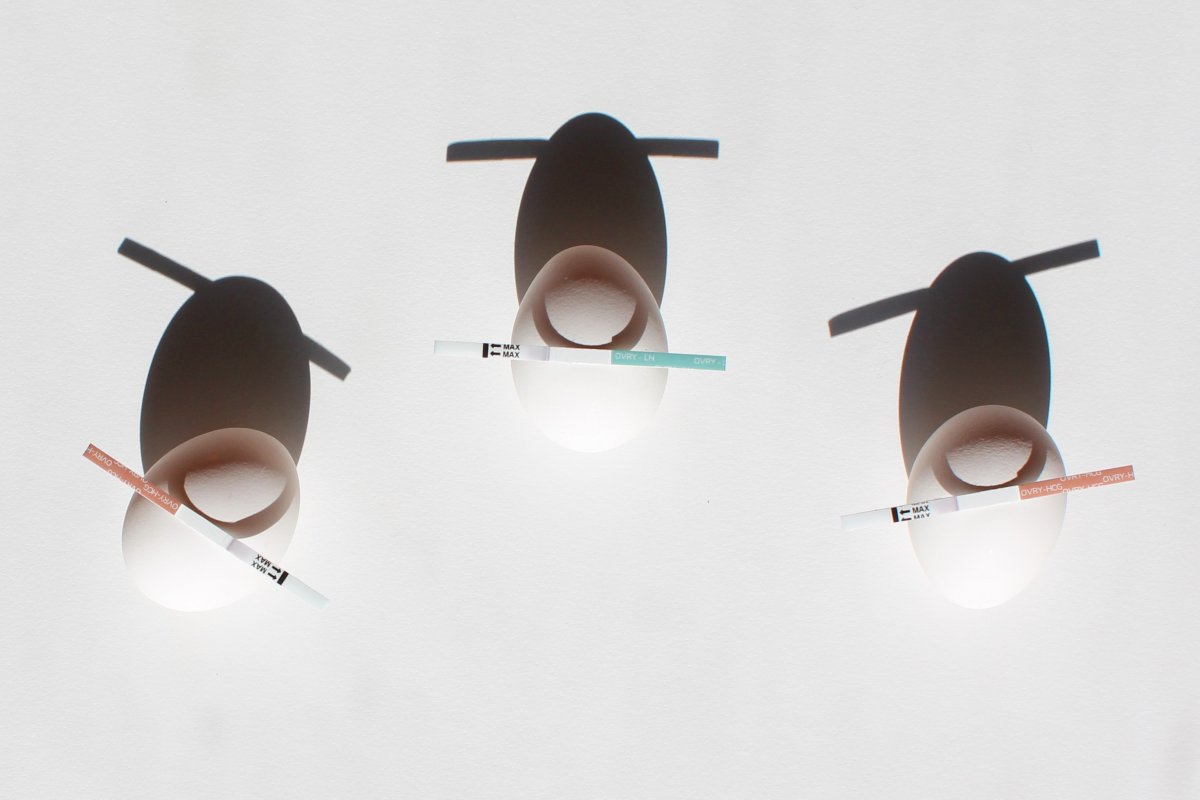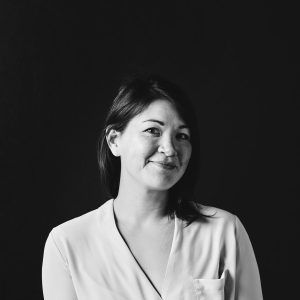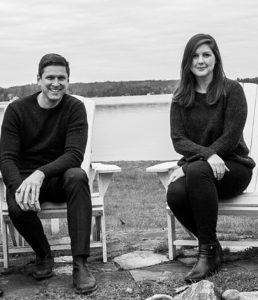[vc_row][vc_column][vc_column_text]Born out of frustration and anxiety, OVRY is set to disrupt and modernize the women’s reproductive health space. Its direct-to-consumer pregnancy and ovulation test strips more discreet, affordable, and sustainable than traditional mid-stream pregnancy tests you’d find on the shelves. They also eliminate the awkward purchase at a drugstore.
Created by Jackie Rhind, OVRY is changing the conversation on why a woman should be taking a pregnancy test—mostly, that it’s not up to a business to decide why.
Sure, there are only two options that are going to appear, pregnant or not pregnant, but why is it that the marketing only focuses on one outcome?
Historically, pregnancy test advertisements have focused on “knowing you’re pregnant, the moment it happens,” or feature a happy couple excited about the result. But what about those who are hoping for a “not pregnant” response?


Having grown up with a medical condition that made it difficult to use hormonal birth control, a negative response was all that Rhind was hoping for every time she made the trip to the drugstore and headed to the pregnancy test aisle.
“Even if you’re using another form of protection like condoms, you can get nervous [about being pregnant], especially as a teenager,” said Rhind. “You already feel anxious, then you have the added worry of going into the store and wondering what the cashier going to say. You’re hoping you don’t run into somebody you know while carrying the huge box—why do they have to be so big?!”
Created for those hoping to avoid similar experiences in mind, OVRY tests ship quickly to your doorstep, are over 99 percent accurate, and are available in multi-packs, so you can have them on stand by for whenever needed.
Though Rhind used her own experience of hoping for a negative result to bring the concept to life, OVRY has also become a convenient and affordable way for those who are hoping for a positive result as well. Its ovulation strips further enhance the company’s mission to help bring peace of mind to anyone suffering from pregnancy-related stress.
“It’s not up to the business to say whether you should be expecting one result or another. And I think that inclusivity and awareness are really lacking in the market right now,” said Rhind. “It’s so narrowly focused on just women trying to conceive it, alienates a big group of people. And that’s where OVRY stands out.”
For this week’s Startup Spotlight, Bay Street Bull spoke with Jackie Rhind, Founder of OVRY, about disrupting the pregnancy test market, challenging age-old stereotypes, and the future of business in the women’s health sphere.[/vc_column_text][vc_text_separator title=”Q&A” color=”custom” style=”dashed” border_width=”3″ accent_color=”#ed6d6d”][vc_column_text]How did you bring OVRY from an idea to a product?
It was challenging. A lot of learning, a lot of mistakes, a lot of expensive mistakes. There were some big moments where, I thought, “This isn’t the right decision. There’s gotta be people better suited for this kind of thing [taking an idea and turning it into a product].” So, I guess a lot of self-doubts, but the closer I got to actually having something that would be going to market, the more it kind of fueled and energized me to keep going.
And why was it important for you to create something like OVRY?
I have a pretty common gene mutation called Factor V Leiden, which makes it more difficult for me to take a lot of the hormonal birth controls that are available. So when I was younger, if I ever had a late period or had a weird feeling, I would get really anxious and think, “Maybe I’m pregnant?” Since wasn’t on birth control. Even if you’re using another form of protection like condoms, you can get nervous, especially as a teenager. You already feel anxious, then you have the added worry of going into the store and wondering what the cashier going to say. You’re hoping you don’t run into somebody you know while carrying the huge box—why do they have to be so big?! I would buy five things I don’t need just to cover up the box. It was just awful.
When I had the idea of a smaller, more convenient test that was purchased online, it just seemed like a no brainer. Initially, I wasn’t thinking about people trying to conceive. I was thinking about people like myself who are just experiencing this anxiety. How great would it be to have a product that you could just keep on hand use whenever you want? Now a large part of our market is women trying to conceive, but at the point that this product was kind of developed, I was more focused on that “trying to avoid pregnancy” market, because of my own personal experiences.
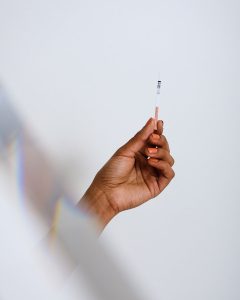

The tests are the same accuracy as any sort of midstream tests you would find from the store. From a functionality perspective, the only difference is that they have to be submerged into a urine sample. So they’re very much similar to the tests a hospital or a doctor’s office might use. They are also a lot more convenient. You can purchase them online and avoid the potentially awkward drugstore situation, and we also offer them in multi-packs, for a way better price. Drugstore tests can be up to $25 for one test. Ours are much cheaper, but also you get more in every box so that you can keep them on hand for whenever you might need them. And they’re just as quick, just as accurate, just as sensitive.
Also, they are more sustainable because they are smaller—they don’t include those big bulky plastic applicators—and there’s no battery in them for the unnecessary digital display. People will often just throw their tests in the garbage, and then those small batteries that are in the test don’t get recycled. They just ended up in the landfill. So, from an environmental standpoint, there’s a lot to be offered through a smaller product like ours.
What kind of responses have you had from the public so far?
The responses have been overwhelmingly positive. A lot of people saying, “I feel so wasteful when I go to the store to purchasing these.” More often than that, people say that they just wait it out to see if they get their period rather than taking a test, and it causes them unnecessary anxiety. As a business, our mission is to reduce pregnancy-related stress for people who have female reproductive systems. Experiencing that anxiety seems so unnecessary when you can have these ultra-sensitive tests that you can just keep on hand.
We’ve had just a huge variety of people using the products, which is also really important. I think a really differentiating factor of our business and brand is that we’re a bit more outspoken. We’re quite a bit education-based and are trying to attack that stigma and those patriarchal narratives about what these products are for. We’re very aware that it’s not up to us, to determine why you need a pregnancy test.
In the ads that I saw growing up, it was about a couple jumping for joy at their positive test result—which is great if that’s what you want—but it completely alienates an entire group of people who maybe don’t want a child right now. It’s not up to the business to say whether you should be expecting one result or another. And I think that inclusivity and awareness are really lacking in the market right now. It’s so narrowly focused on just women trying to conceive it, alienates a big group of people. And that’s where OVRY stands out.
RELATED: Why Nixit Founder Rachael Newton Doesn’t Shy Away from Talking About Menstrual Health
As a woman yourself, do you think it has had a big effect on how you see the industry and how you’ve chosen to market OVRY?
Yeah, absolutely. When you’re exposed to these ads that say the people who should be buying our products should be trying to conceive, if you’re hoping for a negative result, you feel like you shouldn’t be using it or that you’re doing something bad. So, yeah, it definitely played into how our brand voice comes across. Thoughtfully, because of my own experiences, we want to acknowledge that why somebody uses a test, or what they want from that test, is none of our business.
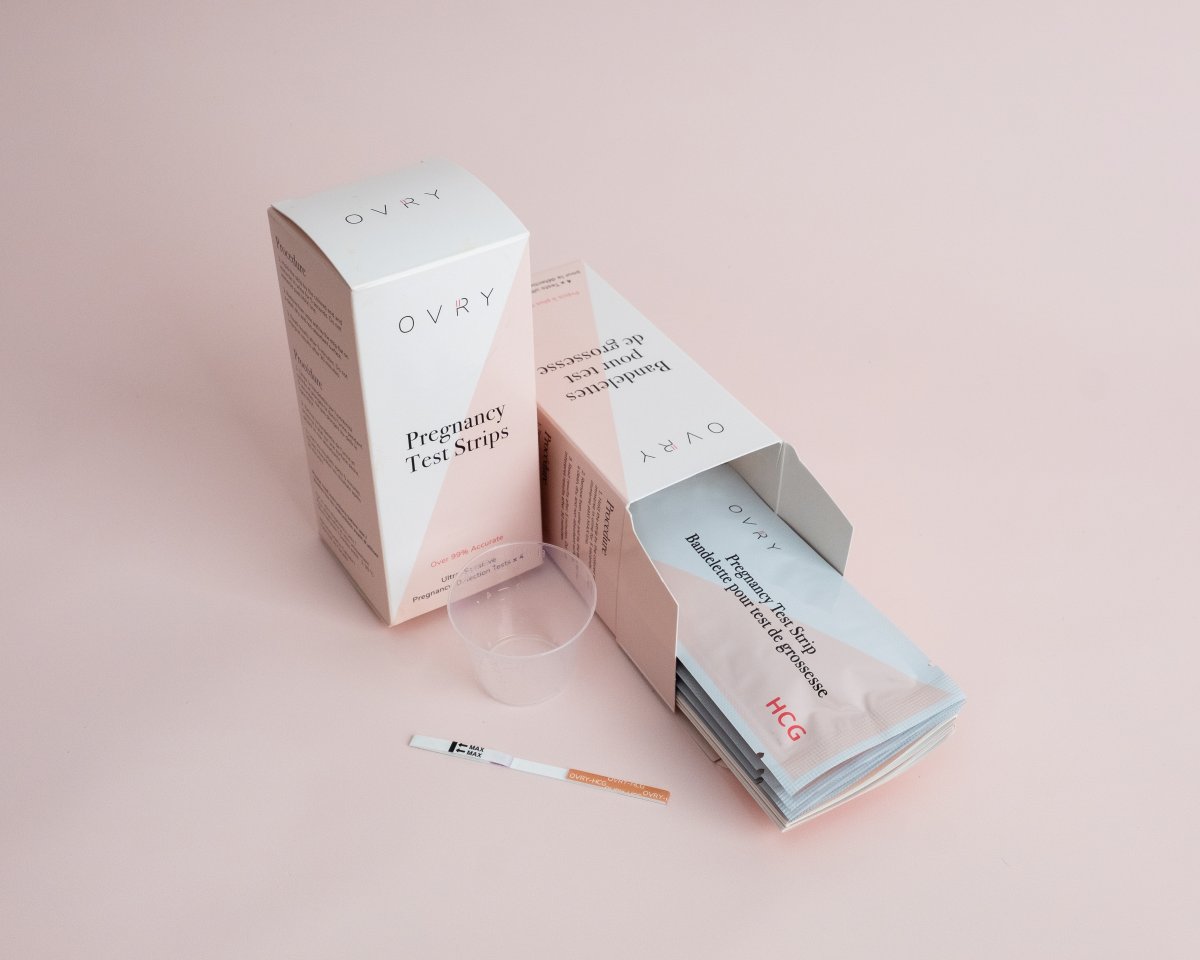

You recently posted on Instagram about your logo being an equal sign on a 90-degree angle. Can you explain the reasoning behind that?
We wanted to keep it simple and we liked the equal sign because it spoke to equality, which in my mind, there’s room for improvement in the entire reproductive health industry to develop products that are more catered to the end-user. I think historically have a lot of like male founders of these businesses that don’t necessarily think of the end-user when they’re developing and marketing and distributing these products. So, I think there’s quite a lot of opportunity to even that playing field. Beyond that, it was also sort of a play on the two lines that are on the test strips. When you’re getting a result, one stripe means negative, two stripes mean positive, as in you’re pregnant. So it has a little bit of a double meaning there.
You were previously a project manager, and you did graduate from business school. How did that prepare you for actually becoming a founder and starting a business?
It’s been interesting. I definitely wish I had retained more of the skills that I learned in school [laughs]. Now it feels like I’ve got my hands in all these different aspects: I put my accounting hat on, I’m doing a little bit of marketing. So, I think it helps because I have a basic understanding of all the different functions that need to happen. It has been interesting to actually put those skills to use, and see what you think it’s going to be like [starting a business] versus what it actually is—making a lot of mistakes.
In business school, I feel like you’re sold this really sexy idea of what an entrepreneur is. You think it’s this exciting roller coaster —and it is a roller coaster—but it’s not always exciting. There’s a lot of learning that has to happen.
On the upside of that though, seeing your product out into the world, what has that been like for you? What does it feel like to know that people are using OVRY products?
Totally worth it. It’s the best thing ever to read people’s reviews and speak with customers. Also just hearing that other people had similar struggles to me, or that had different struggles that this product is now solving is really satisfying and makes it all feel really worth it. It also makes me more motivated to develop other products that can deliver the same peace of mind for our customers.
On the topic of creating new products, what else is in store for OVRY? You have ovulation strips, in addition to the pregnancy test strips. Anything else in the works?
We do have a few products, but they’re not ready yet. They’re in a similar space of fertility and reproductive health, so I’m excited!
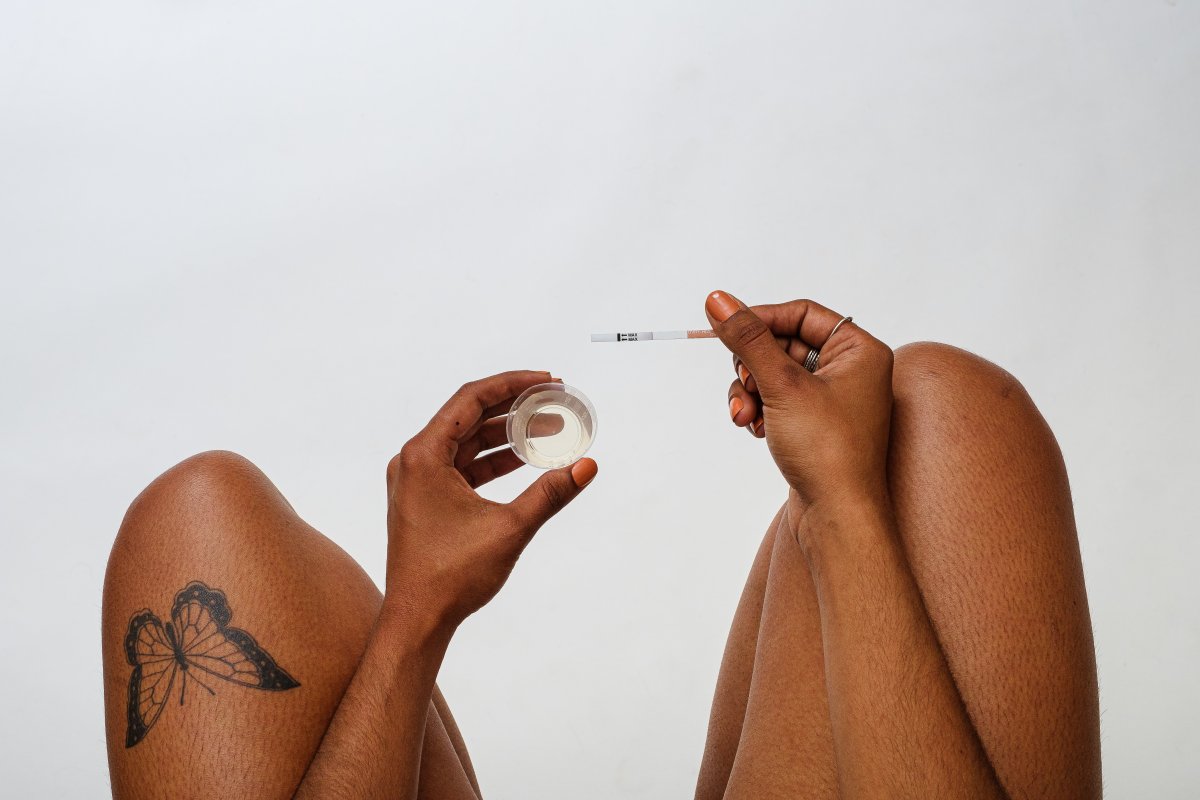

That’s a good question. In 2015, I was really happy to see that the Canadian government finally removed the tax on menstrual health products. That kind of shift is what I’d like to see for the reproductive health industry as well. For example, things like birth control should be free!
I think in terms of the more product-based side, there are a lot of products that are made by men, so they miss the whole purchasing experience and what it feels like to need the product, buy the product, and use the product. So, there’s a lot of work that can be done to improve the quality of the products for women. And I think that’s really exciting.
I think that we’re going to see a lot more growth in the femme tech, sexual health, reproductive health space. Even when you just think about sexual health and orgasms, there’s so much to unpack in that topic. There’s going to be a lot of products that serve women better. That’s what I hope at least for the space, and I hope that we can be a part of that.
RELATED: 5 Feminist Brands Redefining Sexual Wellness
As a woman, I can definitely relate and look forward to seeing that space continue to grow and improve!
Crazy that it’s only just happening now. How great would it have been to have some of these products 10 years ago? I think of period cups or period underwear, and they’re products because people [women] who understand what we need are now taking the reigns and have the means to start these businesses. And it’s just the best thing ever.
I also think the more we have a discussion about what it is to be a woman in a leadership role, and the more we see women taking on these challenges and entrepreneurial pursuits, the more we can stop mimicking the leadership style of a man. I think for a long time we were told to act a certain way or downplay our femininity and compassion [as a leader]. Not only is that wrong, but it doesn’t acknowledge that if you harness your female intuition it’s very valuable. Diversity is very valuable and can help create better products and better business settings.
With that, OVRY is taking on a pretty big industry in and of itself. With pregnancy tests, there are really only a handful of companies that dominate the market. What does it feel like as a first-time founder to try and disrupt it?
It’s intimidating for sure. But I’ve done a lot of work to make sure that the business is set up properly so that we can’t be intimidated by big brands.
I also think it’s a huge opportunity for them to take a step back and say to themselves, “Why is it that this brand can take some of my market share?”
Maybe it’s because we’re using gender-neutral language, giving the consumer an experience that they want, offering educational content, and acknowledging different types of users. If they change the way their sort of business model is right now, at the end of the day, that serves the main purpose of serving women better and reducing barriers to purchasing these products. I think a little competition might bring out the best in those big players. So, it doesn’t bother me.
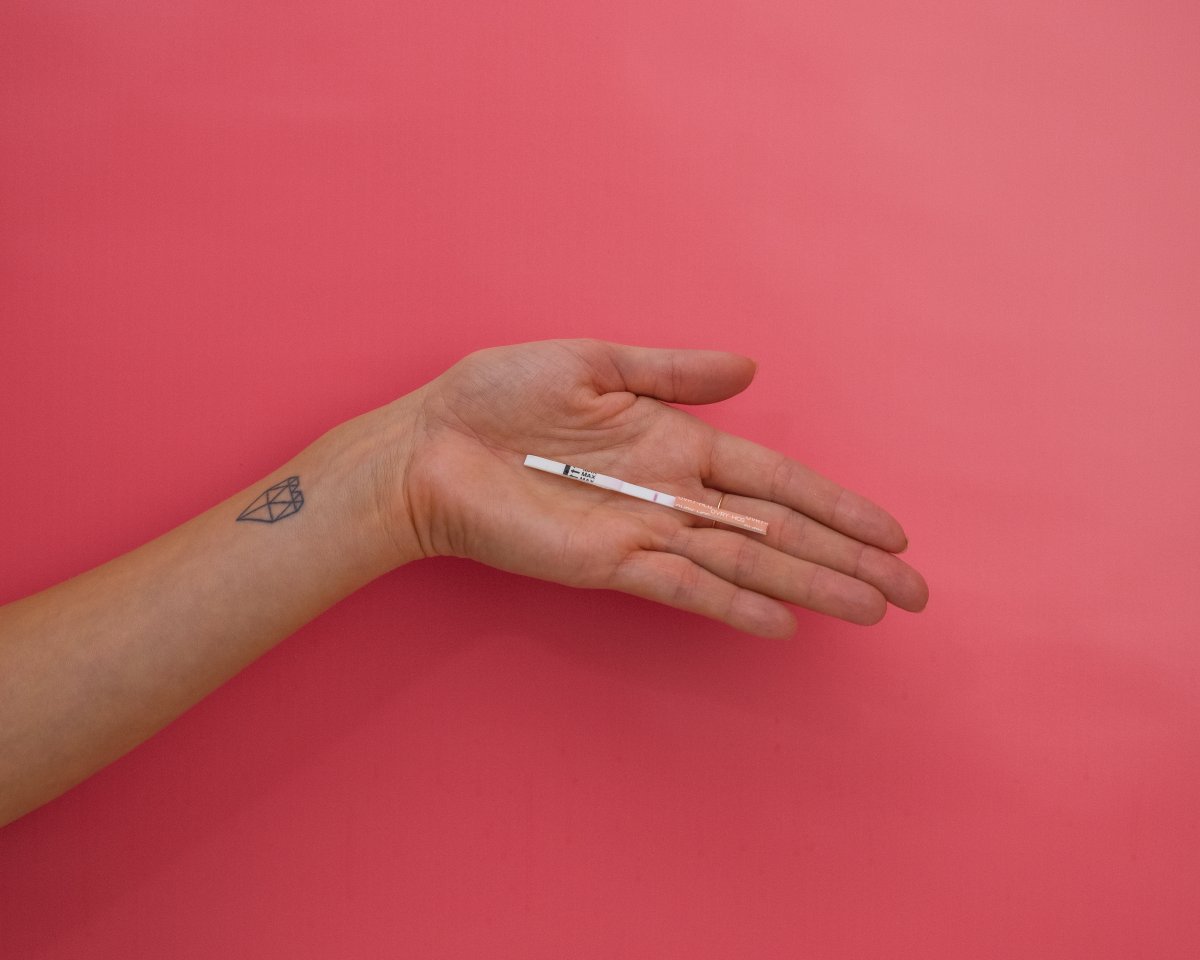

How would you sum up the overall mission of OVRY?
Our mission is to reduce pregnancy-related stress for people with uteruses. I think we will continue to do that by offering our products to more markets, geographically speaking, as well as expanding our product offerings, and improve that purchasing experience so that it is seamless and convenient.
How do you hope OVRY has changed the female reproductive health landscape five, 10 years into the future?
Another five to 10 years from now, when we think about how women’s health is delivered right now, we see so much of it going online right now. We’d like to work towards creating a space for consultations with health professionals or have those people on staff that can offer that extra level of support to our users.
We’ll also have an app at some point that will work in conjunction with our ovulation tests, it’s currently being developed. It will not only track your cycle—several apps do that—but it also helps to interpret the results of your ovulation tests so that you can better know when that surge is occurring because unlike a period, there’s a little bit more difficulty in pinpointing the exact time when you’re experiencing ovulation.
Also, free tests! We want to offer these tests for free to those who need them. So if you email us and you’re like, “I really need some tests.” We can offer you super fast shipping and it’s just like, “We got you, girl!” The details of how that would work aren’t ironed out quite yet, because of course, we don’t want everybody emailing us just to get them for free, but we’re working on it.
A portion of all our sales go towards charities that support women or the planet; there’s always a few causes that are under our realm. Right now they are Girls Who Code, the Canadian Anti-Racism Network, Earthjustice, and Canadian Women’s Foundation. I think the social element of a business is always important![/vc_column_text][/vc_column][/vc_row][vc_row][vc_column][vc_separator color=”custom” accent_color=”#ed6d6d”][yikes-mailchimp form=”1″ title=”1″ submit=”SUBSCRIBE”][/vc_column][/vc_row]


